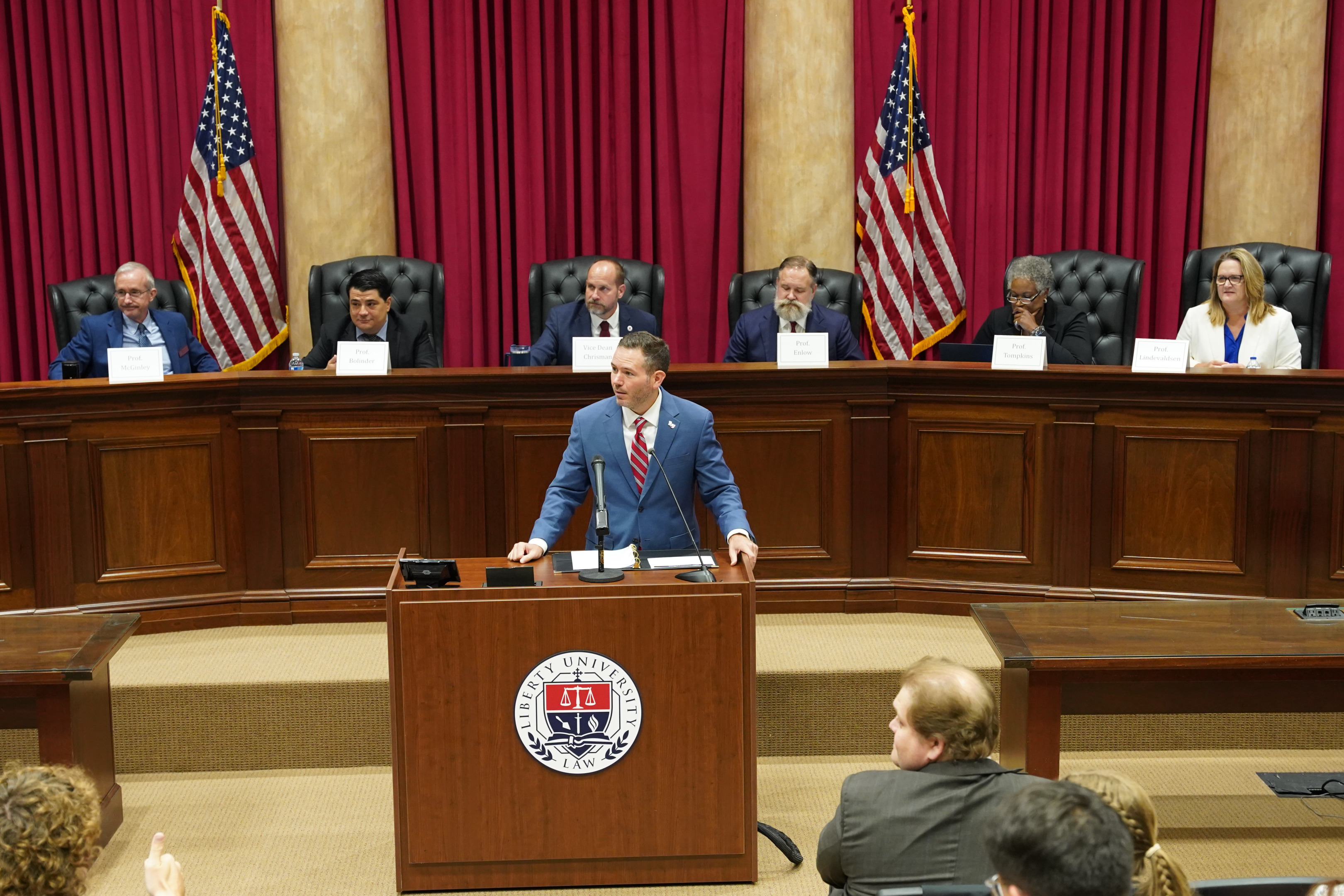Thursday, September 4, 2025

On August 21, 2025, the Liberty University Law Review, a scholarly legal journal run by second and third-year law students, hosted its annual Supreme Court Review. During this event, Liberty Law’s distinguished faculty came together to engage in an intellectual discussion centered around some of the most consequential United States Supreme Court decisions decided in the recent term. Each faculty member analyzed a case and critiqued the Court’s decision from a distinctly Biblical worldview.
Liberty Law faculty and students, as well as many undergraduate students, including from Liberty University’s Helms School of Government, attended the event. This discussion took place in the School of Law’s Supreme Courtroom.
Professor Rena Lindevaldsen was the event’s first speaker. She discussed Mahmoud v. Taylor, a case in which the Court decided that the First Amendment’s Free Exercise Clause prohibits public schools from forcing children to read LGBTQ-themed storybooks without providing parental notification with an opportunity for opt-outs. Professor Lindevaldsen pointed out that the Court came to the right decision, and that the Court’s reasoning—which further defined how someone can allege an unconstitutional burden on their rights to free exercise of religion—was correct and helpful.
The second speaker was Professor Cynthia Tompkins, who spoke about Ames v. Ohio Department of Youth Services. Professor Tompkins provided an informative background on the history and implications of Title VII of the Civil Rights Act of 1964, which bars discrimination in employment based on certain protected classes of individuals. She discussed why the Court was correct in its conclusion in Ames that these protections should apply to majority classes as well as minority classes.
Professor Eric Enlow spoke about Trump v. CASA, Inc., as well as some of the broader implications of the birthright citizenship cases. The main issue more broadly is whether children of illegal immigrants are considered U.S. citizens under the Fourteenth Amendment’s Citizenship Clause. Although the Supreme Court has not yet explicitly ruled on this question, Professor Enlow thoughtfully proposed that the Biblical and historical principle of citizenship, which provides that citizenship would be defined by reference to higher as opposed to mere positive law, should guide the Court’s jurisprudence on this matter.
Professor Eric Bolinder next discussed Federal Communications Commission v. Consumers’ Research. He critiqued the Court’s conclusion that Congress did not impermissibly delegate its legislative duties to the FCC when it allowed the agency to force telecommunications carriers to contribute “sufficient” funds for universal-service programs. Professor Bolinder explained the importance of the nondelegation doctrine and argued for a stricter application of this constitutional principle.
Professor David McGinley continued Professor Tompkins’s discussion on Ames v. Ohio Department of Youth Services. He addressed the argument that private employers typically target minority groups for unfair treatment; Professor McGinley countered this argument with data showing a trend that employers are increasingly discriminating against majority groups. He used the analogy of a pendulum to illustrate that discrimination against majority and minority classes may shift over time. He emphasized the importance of the Court’s holding in light of this changing dynamic.
Vice Dean Rodney Chrisman was the final featured speaker at this event. He discussed Free Speech Coalition, Inc. v. Paxton, in which the Court decided that the First Amendment’s Free Speech Clause did not prohibit the state of Texas from passing a law requiring age verification measures for online providers of pornographic material. Vice Dean Chrisman elaborated on the Court’s reasoning that age-verification imposes a low burden on free speech rights. He also provided a Biblical perspective on the jurisdiction of the civil magistrate as it relates to pornography, emphasizing that Scripture reserves punishment for sin exclusively to God in some areas and permits regulation by the government in other areas.
A question and answer session followed the discussion, where attendees were given the opportunity to ask questions and engage in further dialogue on these important issues.
The annual Supreme Court Review is a back-to-school tradition at Liberty Law. In addition to the event, several faculty members will also write an article with the Liberty University Law Review to accompany their discussion and analysis. These articles will be published in an upcoming issue in the twentieth volume of the Liberty University Law Review and will be available on Liberty’s digital commons.